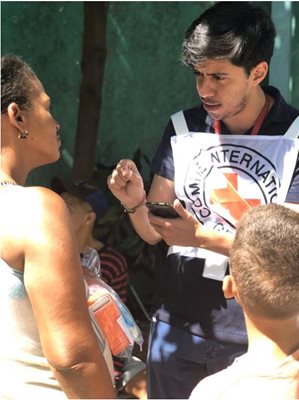Below are the personal stories of four humanitarians who benefitted from RedR UK training. Their words are testament to their unwavering commitment of the aid sector to provide assistance wherever needed.
With our Summer Appeal continuing, please consider donating to RedR UK so that we can train more humanitarians to respond to disasters. With the right skills, effective aid can be delivered where it is needed most. Your support makes our work possible.
You can donate here.
Rony Quintero, International Committee of the Red Cross
My day begins much like anyone else’s – with a good cup of coffee. It is important to start the day well, and I feel that each day I have a new opportunity to improve as a person, in all aspects.
I am a civil engineer, and for the last two years I’ve been working for the Red Cross in Venezuela. My organization is focused on the protection of people who suffer from armed conflict and the situations of violence that this unleashes. Currently, the organization works in border areas, helping in the most holistic way possible. In this sense, there is currently a lot of internal and external migration, and it is important to understand how to address people’s needs in emergency situations, to improve the support offered and to maintain their dignity.
Before working for the Red Cross, my work had a commercial, stock or mercantile purpose. The shift to working in a humanitarian organisation has radically changed my way of thinking; I am now a different man, with more humanity.
for the Red Cross, my work had a commercial, stock or mercantile purpose. The shift to working in a humanitarian organisation has radically changed my way of thinking; I am now a different man, with more humanity.
In practice, I try to make an adequate evaluation of people’s needs, to make sure the assistance we provide is as effective as possible. The training has allowed me to broaden the vision of analysis and the consideration of important factors when delivering humanitarian aid, taking into consideration the “do-no-harm” principle and the inclusion of all people.
The training I took with RedR UK has helped me understand how to structure an emergency response in urban areas. Before the training, I did not have the full picture of a necessary response. After the training, I now have a broader, more holistic overview.
Irene Planchuelo, TECHO-Chile
I am an architect in Chile, in charge of the construction department of an NGO dedicated to building fairer and more sustainable cities. Currently I alternate remote working with field visits. One of the things that I like the most about my work is our inclusive approach where we develop solutions jointly with communities and young volunteers.
I found the training offered by RedR very relevant to my professional interests, both for my current work and for my future goals, focusing on the provision of accommodation and basic services in humanitarian action in the face of different crises, including urban emergencies such as those experienced in Latin America today.
Since last year the focus of my organisation has become more humanitarian, delivering more urgent support for families whose basic needs are not covered. At the same time, I began to lead the area of operations in which we deliver temporary housing for families in precarious conditions.
A pregnant migrant woman and her husband were beneficiaries of the programme. After becoming unemployed during the COVID-19 pandemic, the couple moved into the husband’s mother’s house. With only one bedroom, conditions were overcrowded. After an evaluation of the case, we proceeded to build a temporary house for the couple, with the help of volunteers, professionals, and the family themselves. The couple now have a space of their own, providing dignity and privacy until they can collect enough savings for a more long-term housing solution.
My work is aligned with my mission. What motivates me the most is being able to work directly with communities, knowing first-hand the needs of families and individuals and including them as protagonists in decision-making.
.png)
Diana Montoya, Norwegian Refugee Council
I have worked in the Norwegian Council for Refugees since 2018, as part of the emergency response team assisting migrants from Venezuela. The training that I attended with RedR UK allowed me to acquire more tools and knowledge to carry out my work in places with diverse contexts and humanitarian complexities.
We work hard to provide humanitarian assistance for migrants, especially due to the recent crisis. We have done this using an approach that provides legal assistance, alternative education spaces for children and adolescents, water, sanitation and hygiene (WASH) services, temporary accommodation services, delivery of shelter kits for populations on the move and counselling and support focused on the protection of people.
I had the opportunity to support the development of a multi-service care space in Venezuela, focused mainly on WASH, that would allow the migrant population to access hygiene facilities but also additional services such as legal advice before crossing to the border into Colombia. Being there, I understood that migration and human mobility is a response to oppression in the search for freedom and a better quality of life. It is an inalienable right that should be guaranteed to everyone. This inspired me to seek more approaches and mechanisms to alleviate the suffering of people on the move.
With your donations, RedR UK will be able to train more aid workers like Irene, Rony, and Diana. Please donate today.
Click here to donate.